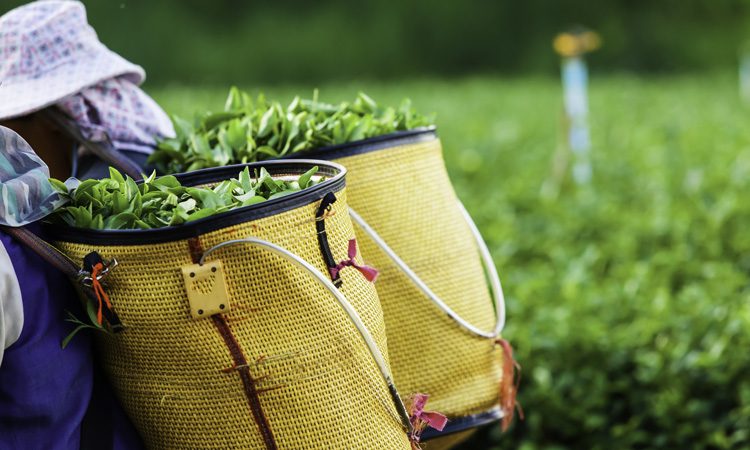Reaching for sustainability in the tea industry
- Like
- Digg
- Del
- Tumblr
- VKontakte
- Buffer
- Love This
- Odnoklassniki
- Meneame
- Blogger
- Amazon
- Yahoo Mail
- Gmail
- AOL
- Newsvine
- HackerNews
- Evernote
- MySpace
- Mail.ru
- Viadeo
- Line
- Comments
- Yummly
- SMS
- Viber
- Telegram
- Subscribe
- Skype
- Facebook Messenger
- Kakao
- LiveJournal
- Yammer
- Edgar
- Fintel
- Mix
- Instapaper
- Copy Link
Posted: 7 November 2019 | Kate Harveston - online journalist and blogger | No comments yet
The tea industry sees many stages where sustainability could be ignored, but the consumer plays a part in looking out for them. Here, Kate Harveston explores.


Green tea or chai? Whatever the type of tea, consumers probably drink it for the light, pleasant flavour, and the myriad of health benefits, but do they ever pause to think about how producers grow and bag that brew?
Labourers in the fields often endure poverty and poor working conditions and several manufacturers use chemicals processes and wrap boxes in single-use plastic. When it comes to sustainability, it is fair to say that the tea industry has significant areas in which it can improve.
Tea manufacturing, distribution and the planet
A lot of consumers drink tea for the health benefits, but are often unaware that they are consuming carcinogens with their morning cuppa. Some manufacturers use chemicals like chlorine bleach in manufacturing their bags, a process which harms vulnerable aquatic ecosystems as well as the human body.
Research has also discovered that fish embryos in polluted waters experience severe heart defects and fluid buildup around the organs. Scientists remain unsure exactly how consuming seafood contaminated with chemicals affects human health, however, these physical deformities may lead to the extinction of species. When one food source goes extinct, it creates a ripple effect up the food chain, and the consequences can be seen globally.
Additionally, many manufacturers continue to package their products in single-use plastic. Some make their bags out of the material, which adds to the current environmental catastrophe. Such brews can release billions of plastic particles into just one cup. When marine animals consume these particles, they cannot digest them and they slowly starve to death, even though their stomachs are technically full – scientists have found plastic particles in the tiniest sea shrimp.
Nor does this represent the only environmental issue created by plastic use in teas. Globally, human beings purchase a million plastic bottles per minute. They fail to recycle 91 percent of these. Because the substance takes hundreds of years to decompose, bottles often end up in landfills and, eventually, make their way to the ocean.
Many plastic bottles contain a chemical known as BPA and if bottles overheat, it causes the material to release this chemical, where it enters your body and can damage fertility and increase cancer risk. It interferes with normal hormonal function and may spur tumour growth.
Consumers can opt for tea packaged in glass instead of plastic — and recycle the bottles. Because glass is made from sand, it is easy to recycle. However, if these containers end up in landfills, they can take a million years to decompose.
Workers’ rights in the tea industry
In the US, many workers benefit from minimum wage laws. However, in overseas tea fields, workers may earn pennies per day for backbreaking labour. Even in nations that do have wage laws on the books, people often cannot survive on their meagre earnings.
Some brands have instituted measures to create better working conditions. Seth Goldman, co-founder of Honest Tea, committed to using only fair-trade certified products, among other sustainable initiatives. This designation indicates that the products are grown without the use of child labour and workers receive fair compensation for their local area and enjoy safer working conditions.
Still, critics of the means of production persist. They make the valid point that there is a big difference between the minimum wage and a liveable one. Additionally, many certification organisations have blind spots when it comes to the pay of plantation workers. Nevertheless, consumers can support human rights around the globe by choosing their brew carefully. Look for teas bearing the fair-trade certified label.
Making tea even more sustainable
Many consumers do not pay much attention to where their tea comes from. However, it is possible to make the way we approach tea production friendlier to the planet. The industry is certainly making changes, but it will take time. In the meantime, creating support for sustainable brands is a great start.
About the author
Kate Harveston is an online journalist and blogger who writes about sustainability, nutrition, and healthcare.
Related topics
Beverages, Environment, Health & Nutrition, Supply chain, Sustainability









